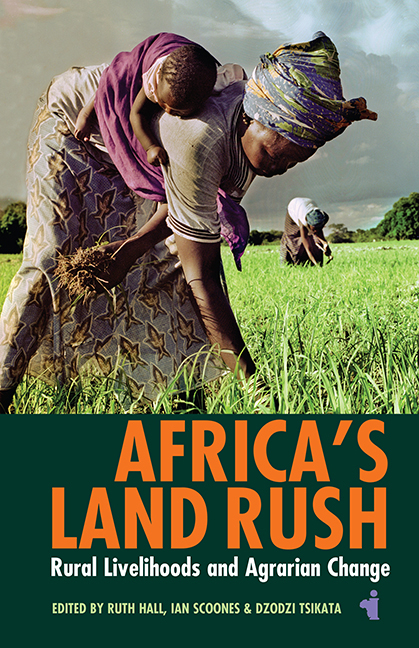Book contents
- Frontmatter
- Contents
- List of Maps, Tables & Figures
- Notes on Contributors
- Preface
- Acknowledgements
- List of Abbreviations
- 1 Introduction: The Contexts & Consequences of Africa’s Land Rush
- 2 State, Land & Agricultural Commercialisation in Kwara State, Nigeria
- 3 Recent Transnational Land Deals & the Local Agrarian Economy in Ghana
- 4 Large-Scale Land Acquisitions in Ethiopia: Implications for Agricultural Transformation & Livelihood Security
- 5 Land Deals & Pastoralist Livelihoods in Laikipia County, Kenya
- 6 Land Deals in the Tana Delta, Kenya
- 7 The State & Foreign Capital in Agricultural Commercialisation: The Case of Tanzania’s Kilombero Sugar Company
- 8 Trapped between the Farm Input Subsidy Programme & the Green Belt Initiative: Malawi’s Contemporary Agrarian Political Economy
- 9 Agrarian Struggles in Mozambique: Insights from Sugarcane Plantations
- 10 South African Commercial Farmers in the Congo
- References
- Index
5 - Land Deals &Pastoralist Livelihoods in Laikipia County, Kenya
Published online by Cambridge University Press: 21 May 2021
- Frontmatter
- Contents
- List of Maps, Tables & Figures
- Notes on Contributors
- Preface
- Acknowledgements
- List of Abbreviations
- 1 Introduction: The Contexts & Consequences of Africa’s Land Rush
- 2 State, Land & Agricultural Commercialisation in Kwara State, Nigeria
- 3 Recent Transnational Land Deals & the Local Agrarian Economy in Ghana
- 4 Large-Scale Land Acquisitions in Ethiopia: Implications for Agricultural Transformation & Livelihood Security
- 5 Land Deals & Pastoralist Livelihoods in Laikipia County, Kenya
- 6 Land Deals in the Tana Delta, Kenya
- 7 The State & Foreign Capital in Agricultural Commercialisation: The Case of Tanzania’s Kilombero Sugar Company
- 8 Trapped between the Farm Input Subsidy Programme & the Green Belt Initiative: Malawi’s Contemporary Agrarian Political Economy
- 9 Agrarian Struggles in Mozambique: Insights from Sugarcane Plantations
- 10 South African Commercial Farmers in the Congo
- References
- Index
Summary
Introduction
Laikipia County in Kenya's central drylands has had a long and complex history of land appropriation and reorganisation, from the colonial era to the present. Even so, the scale of recent and proposed land deals is unprecedented. These involve a range of foreign and domestic investors and different interest groups. Former commercial ranch managers are setting up as brokers and identifying absentee title holders in order to persuade them to consolidate their holdings and sell. The latter are responding to the new rush, which is fuelled by foreign entrepreneurs, diplomats, aid workers and some white Zimbabwean farmers. The buyers of these consolidated plots are now fencing their ranches, which has created tensions with the Maasai pastoralists and other herders who have been using this land for generations.
Thus, over recent years, there have been significant changes in the pattern of land ownership in Laikipia. These changes are set against a background of profound inequalities in land ownership and control: 40.3 per cent of land in Laikipia is controlled by just 48 individuals (as shown in the Ministry of Lands registry for Laikipia County in 2010). As this chapter demonstrates, contemporary changes in land ownership are not leading to better livelihood outcomes, particularly for Maasai pastoralists.
This chapter starts with a brief overview of the changes in land control in Laikipia from the colonial era to the present. It discusses the geography of land use and the patterns of inequality evident in land ownership and access. It then addresses the emerging rural livelihoods, food security and patterns of social differentiation that are compounding an already precarious situation related to access, use and management of resources. The chapter further explores the conflicts and resistance that have arisen as a result of land appropriation, and concludes by urging the government to address land issues in the county.
The chapter is based on many years working with pastoralists in the Laikipia area (Map 5.1), complemented by a detailed field study carried out between 2011 and 2013, which involved interviews with different stakeholders in the study area and beyond.
- Type
- Chapter
- Information
- Africa's Land RushRural Livelihoods and Agrarian Change, pp. 83 - 98Publisher: Boydell & BrewerPrint publication year: 2015
- 3
- Cited by



